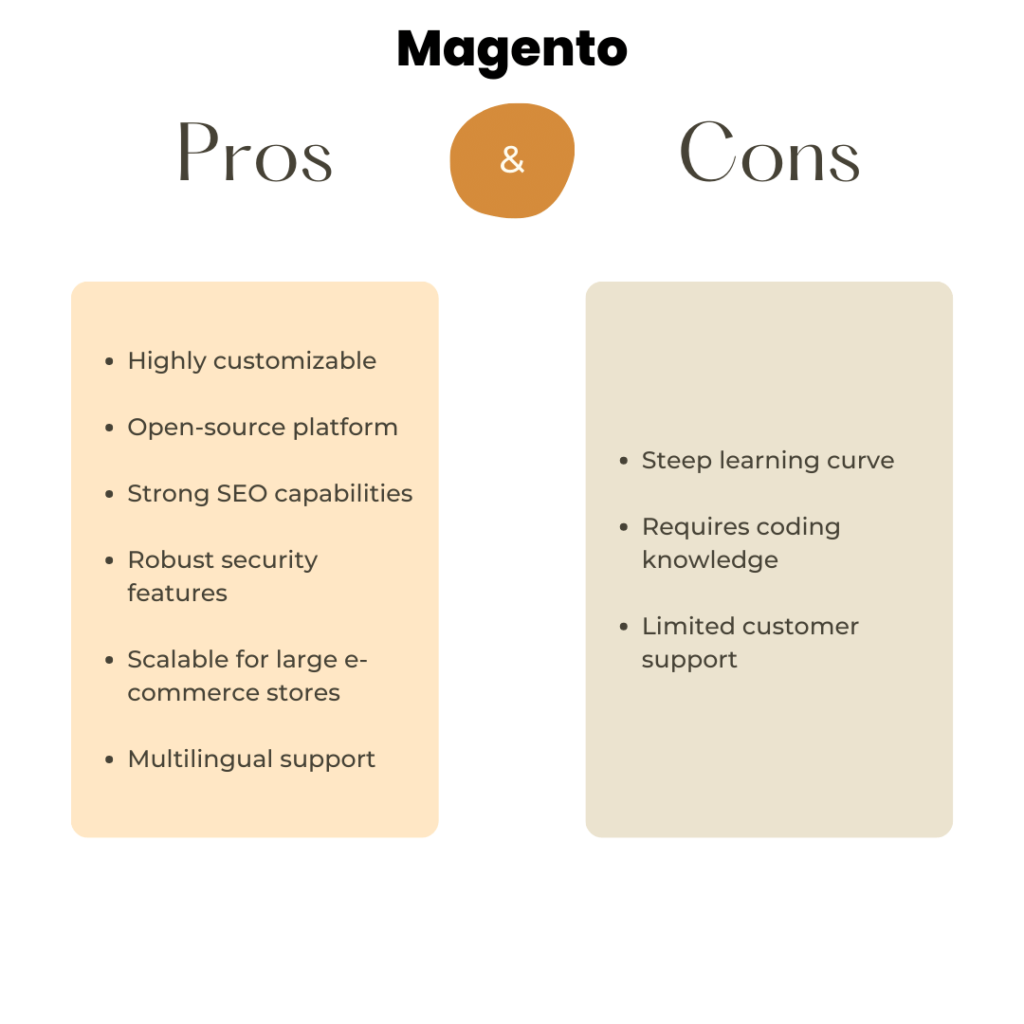If you’re thinking about starting an e-commerce business, you’re probably wondering which platform is better: Magento or Shopify? Both platforms have their strengths and weaknesses and choosing the right one can make or break your online store. In this article, we’ll compare Magento and Shopify in terms of pricing, customization, SEO, and more to help you make an informed decision.
1. Introduction
Magento and Shopify are two of the most popular e-commerce platforms on the market. Magento is an open-source platform that’s highly customizable, while Shopify is a hosted platform that’s easy to use and requires no coding knowledge. Both platforms have their own unique strengths and weaknesses, and the one you choose will depend on your specific needs and goals.
2. Pricing
One of the biggest differences between Magento and Shopify is pricing. Magento is an open-source platform, which means it’s free to use. However, you’ll need to pay for hosting, a domain name, and any premium extensions or themes you want to use. On the other hand, Shopify is a hosted platform, which means you pay a monthly fee to use the platform. The pricing for Shopify ranges from $29 per month for the basic plan to $299 per month for the advanced plan. While Shopify is more expensive than Magento, it includes hosting, a domain name, and customer support, which can save you money in the long run.
3. Customization
One of the biggest advantages of Magento is its customization options. Magento is an open-source platform, which means you have access to the platform’s source code and can customize it to your heart’s content. You can add custom functionality, change the look and feel of your site, and create a completely unique online store. On the other hand, Shopify has limitations when it comes to customization. While you can customize your store using the Shopify theme editor and by adding custom code, you don’t have access to the platform’s source code, which can limit your customization options.
4. SEO- Magento & Shopify
When it comes to SEO, both Magento and Shopify offer strong capabilities, but Magento has a slight edge in this area. Magento is specifically designed to be SEO-friendly and includes a range of features that can help improve your website’s search engine rankings.
One of the main advantages of Magento’s SEO capabilities is its flexibility. Magento allows for extensive customization of URL structures, meta tags, and sitemaps, which can help search engines crawl and index your site more effectively. This means you can optimize your site’s content and structure to improve its visibility in search engine results pages (SERPs).
Shopify also includes basic SEO features like customizable meta tags and sitemaps, but it doesn’t offer as much flexibility as Magento. This may limit your ability to fully optimize your site for SEO purposes. However, Shopify’s built-in features, such as fast load times and mobile responsiveness, can still help improve your site’s overall SEO performance.
5. Security- Magento & Shopify
Ensuring the security of your e-commerce store is crucial for protecting sensitive customer data and maintaining the trust of your customers. Fortunately, both Magento and Shopify prioritize security and offer robust features to protect your online store.
Magento is well known for its strong security features and reputation for protecting customer data. The platform includes advanced security options like two-factor authentication, encryption, and secure payment gateways. Additionally, Magento offers regular security updates to address any potential vulnerabilities.
Similarly, Shopify takes security seriously and offers a range of features to protect your store from potential threats. The platform includes SSL certificates, which encrypt sensitive data and help prevent data breaches. Shopify is also PCI compliant, which means it meets industry standards for credit card security. Furthermore, Shopify offers fraud detection features that can help prevent fraudulent transactions and protect your business from financial losses.
Overall, both Magento and Shopify are secure e-commerce platforms that prioritize the safety and protection of customer data. If security is a top priority for your business, you can feel confident choosing either platform to power your online store.
Ready to launch your e-commerce store but not sure which platform to choose? Discover the strengths and weaknesses of Magento and Shopify and choose the perfect fit for your business. Contact Us
6. Integrations
One of the advantages of using an e-commerce platform like Magento or Shopify is the ability to easily integrate with third-party apps and services. This can help you customize your store, add new functionality, and streamline your business processes. While both Magento and Shopify offer a wide range of integrations, there are some differences between the two platforms.
Magento has a slight advantage in this area due to its open-source nature. Because the platform is open-source, developers have created a vast array of extensions and integrations that can help you customize your store to your exact needs. With thousands of integrations available, you can easily find the right tools to help you manage inventory, process payments, or optimize your store for SEO.
Shopify also offers a wide range of integrations, but it can be more difficult to find specific integrations or customize them to your needs. Shopify’s app store includes many popular integrations like social media integrations, email marketing tools, and accounting software. However, if you need a more specific integration or functionality, you may need to hire a developer to create a custom solution for your store.
In summary, both Magento and Shopify offer a wide range of integrations with third-party apps and services. However, Magento has a slight advantage in this area due to its open-source nature and vast array of extensions and integrations. If you need a high degree of customization or have specific integration needs, Magento may be the better choice for your business.
7. Customer Support
Customer support is an essential factor to consider when choosing an e-commerce platform. As a business owner, you need to ensure that you can get the help you need when you encounter problems or have questions about your store. When it comes to customer support, Magento and Shopify differ in terms of accessibility and quality.
Magento’s support is community-based, which means you’ll need to rely on forums, user guides, and community discussions to find answers to your questions. Magento has a large and active community of developers and users who can help you troubleshoot issues or provide guidance on how to use the platform. While community-based support can be helpful, it may not be the fastest or most reliable way to get help.
Shopify, on the other hand, offers 24/7 customer support via phone, email, and live chat. This means you can get help at any time, day or night. Shopify’s customer support team is knowledgeable and responsive, and they can help you with anything from technical issues to general questions about using the platform. With Shopify, you have the peace of mind of knowing that help is always just a phone call or chat message away.
In summary, both Magento and Shopify offer customer support, but they differ in terms of accessibility and quality. Magento’s support is community-based, which can be helpful, but it may not be as responsive as Shopify’s 24/7 customer support. Shopify’s customer support is more accessible and responsive, which can be a significant advantage if you need quick help or have urgent issues that need to be resolved.
8. Ease of Use
Ease of use is a significant factor to consider when choosing an e-commerce platform. Shopify is known for its user-friendly interface and intuitive design, making it easy for anyone to set up and manage an online store. Its drag-and-drop interface and simple dashboard make it easy to add products, manage orders, and track sales. Shopify also offers a wide range of pre-designed templates, which can be customized to create a unique and professional-looking store.
On the other hand, Magento can be more challenging to use, especially for those without coding experience. Magento’s customization options are a significant advantage, but they can also make the platform more complex and difficult to navigate. Magento offers a vast array of customization options, which can be overwhelming for beginners. The platform requires a certain level of technical expertise and knowledge to use efficiently, which may not be ideal for those looking for a simple and straightforward e-commerce solution.
While Shopify offers a more user-friendly experience, Magento’s complexity can be a benefit for those with specific needs or technical expertise. Magento’s advanced customization options and functionality make it an ideal choice for larger businesses or those with complex requirements. However, for smaller businesses or those without technical expertise, Shopify’s ease of use may be the more practical choice.
9. Mobile Responsiveness
As mobile shopping continues to grow in popularity, having a mobile-responsive e-commerce store is crucial. Both Magento and Shopify recognize this and offer mobile-responsive designs. However, the level of flexibility and customization available differs between the two platforms.
Magento’s open-source platform allows for greater flexibility in creating a custom mobile-responsive design. This means you can design your store specifically for mobile devices and optimize the user experience for mobile shoppers. With Magento, you have the freedom to customize your mobile-responsive design to suit your brand and unique needs.
On the other hand, Shopify’s mobile-responsive designs are more limited in terms of customization. While you can still make some changes to the design, you may be limited by the platform’s built-in features and design options. This can be a disadvantage for businesses that want a highly customized mobile-responsive design.
Magento has the advantage when it comes to mobile-responsive design flexibility and customization. However, it’s worth noting that both platforms provide mobile-responsive designs that will ensure your store is accessible and user-friendly on mobile devices.
10. Performance and Speed
Performance and speed are vital components of a successful e-commerce store. A slow website can deter customers and hurt your business. When it comes to performance, both Magento and Shopify offer fast load times and high performance. However, Magento has a slight advantage in terms of scalability. Magento is known for its ability to handle large volumes of traffic and data, making it a great choice for large e-commerce stores with high traffic. It can also handle complex transactions and inventory management. On the other hand, Shopify may not be as scalable as Magento and can struggle with larger stores, which can lead to slower load times and decreased performance.
It’s worth noting that both platforms offer features to improve website speed and performance. For example, both platforms offer content delivery networks (CDNs) and caching to help speed up load times. Additionally, both platforms have robust hosting options, including cloud hosting, to help ensure website uptime and fast page load times.
Struggling to decide between Magento and Shopify for your online store? Let us help you make an informed decision. Contact our e-commerce experts.
Overall, when it comes to performance and speed, both Magento and Shopify are strong contenders. However, if you have a large store with high traffic, Magento may be the better choice for scalability and overall performance. If you have a smaller store, Shopify’s performance should be more than sufficient.
11. Payment Gateway Options
When it comes to payment gateway options, both Magento and Shopify offer a great variety of choices. These payment gateway options are necessary for an e-commerce store to receive and process payments from customers. Both platforms support popular payment gateways like PayPal, Stripe, and Authorize.net, which are widely used and trusted by customers.
However, Magento’s open-source platform allows for more flexibility and customization when it comes to integrating with different payment gateway options. This is particularly useful for businesses that require specific payment options or need to integrate with lesser-known or regional payment gateways. Magento’s open-source code enables developers to create custom integrations that cater to specific business needs, making it a good option for businesses with complex payment requirements.
Shopify also offers a wide range of payment gateway options, but customization options may be more limited. Shopify’s platform is closed source, meaning that there are limitations to how much businesses can customize and integrate with different payment gateways. However, for most small to medium-sized businesses, Shopify’s payment gateway options are sufficient, and the platform makes it easy to get started and manage payments.
12. Multilingual Support
When it comes to multilingual support, having a platform that can cater to a global audience is crucial for the success of your online store. Both Magento and Shopify offer multilingual support, but the level of ease and customization differs between the two platforms.
Magento’s open-source platform offers more flexibility when it comes to creating a custom multilingual store. Developers can create their own translations and add them to the platform, which allows for greater control over the language options available on the store. This makes it easier to create a customized shopping experience for customers who speak different languages.
On the other hand, Shopify’s multilingual support can be more limited and difficult to customize. Shopify offers built-in translations for certain languages, but these translations may not cover all areas of the store. For example, some areas like product descriptions, checkout pages, and email notifications may not be translated, which can lead to a confusing shopping experience for customers who don’t speak the default language of the store.
To overcome this limitation, Shopify offers a range of third-party apps that can be used to add multilingual support to the store. However, this can add additional costs and may require additional setup and maintenance.
13. Community and Resources
Magento and Shopify have built strong communities that can offer tremendous help for users. Magento has a community-driven support system, which means that users can access a wealth of knowledge and resources through its forums and user guides. The forums are a great place to ask questions, get feedback, and learn from other users’ experiences. In addition, Magento has a vast library of extensions and integrations created by the community, which can be easily downloaded and installed to add new features and functionality to your store.
On the other hand, Shopify’s community is also robust and offers a variety of resources to help users grow their stores. The Shopify blog is an excellent source of information on e-commerce trends, marketing strategies, and industry news. The podcast, called “Shopify Masters,” is another valuable resource that features interviews with successful e-commerce entrepreneurs who share their stories and insights. Additionally, Shopify’s forums are a great place to connect with other users, get advice, and share your own experiences.
Overall, both Magento and Shopify have strong communities and resources that can help you get started and grow your online store. Whether you prefer a community-driven support system or a comprehensive suite of resources, both platforms have plenty to offer.
14. Magento vs Shopify: Pros and Cons
So which platform is better: Magento or Shopify? Here are some of the pros and cons of each platform:
Magento Pros:
- Highly customizable
- Open-source platform
- Strong SEO capabilities
- Robust security features
- Scalable for large e-commerce stores
- Multilingual support
Magento Cons:
- Steep learning curve
- Requires coding knowledge
- Limited customer support
Shopify Pros:
- Easy to use and set up
- User-friendly interface
- 24/7 customer support
- Hosted platform with built-in hosting and domain name
- Fast load times and performance
- Wide range of payment gateway options
- Mobile-responsive designs
Shopify Cons:
- Limited customization options
- Limited scalability for larger stores
- Transaction fees for using third-party payment gateways
- Limited multilingual support
15. Conclusion
Both Magento and Shopify are powerful e-commerce platforms that offer a wide range of features and capabilities. Choosing the right platform depends on your specific needs and priorities. If you prioritize customization, scalability, and SEO capabilities, Magento may be the better choice for you. If you prioritize ease of use, customer support, and built-in hosting and domain name, Shopify may be the better choice.
Ultimately, it’s important to carefully evaluate your options and choose a platform that aligns with your business goals and priorities. With the right e-commerce platform, you can build a successful online store and grow your business online.
Don’t let the choice between Magento and Shopify hold you back from launching your online store. Get expert guidance on which platform is right for your business by contacting our e-commerce experts.
FAQs
Can I migrate from Magento to Shopify?
Yes, it’s possible to migrate from Magento to Shopify. However, the process can be complex and may require the help of a developer or third-party migration tool.
Does Magento have transaction fees?
No, Magento does not have transaction fees. However, you will need to pay for hosting and domain name separately.
Can I use third-party payment gateways with Shopify?
Yes, Shopify offers a wide range of payment gateway options, including third-party options like PayPal and Stripe.
Can I customize my Shopify store?
Yes, you can customize your Shopify store using pre-made themes and templates, as well as through custom coding and development.
Is Shopify better than Magento for small businesses?
It depends on your specific needs and priorities. Shopify is known for its ease of use and customer support, making it a good choice for small businesses. However, if you prioritize customization and scalability, Magento may be a better choice.
Read article on 10 Reasons Why Magento is the Best E-commerce Platform to help you take better decision




